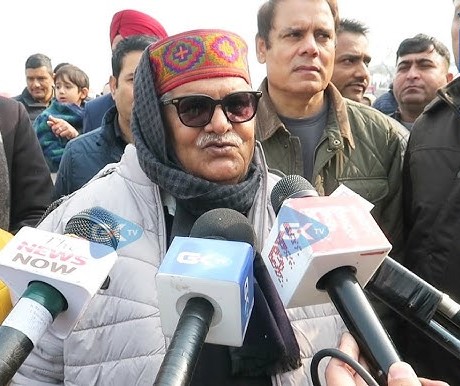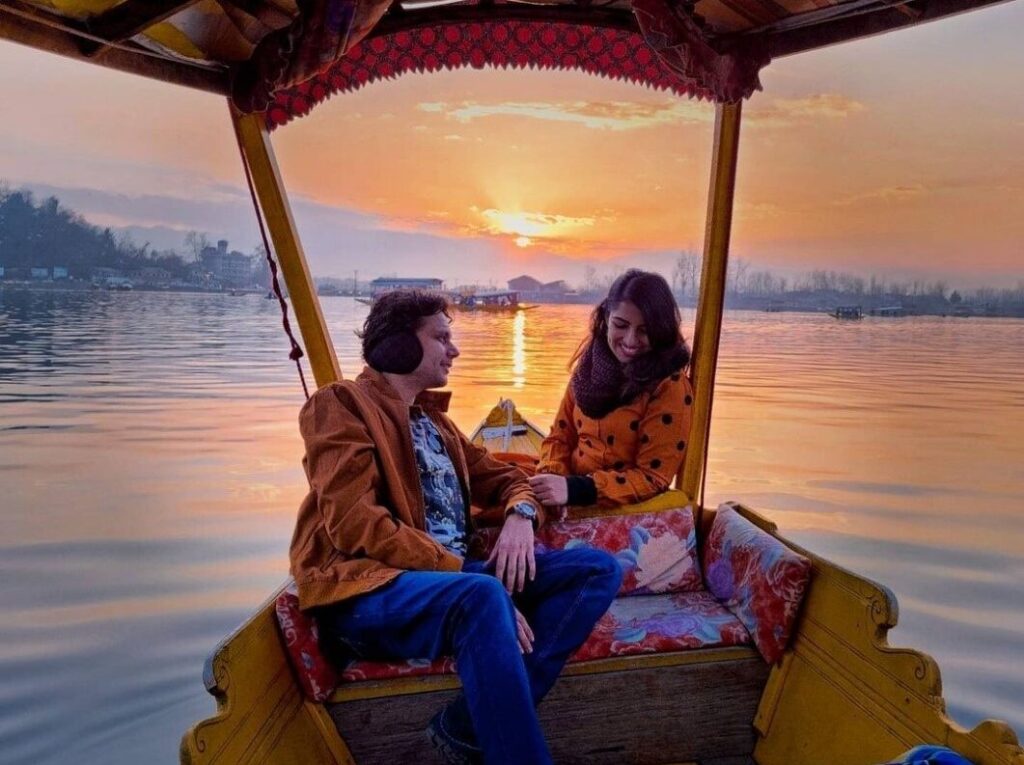Punjab Governor Invites Tourists to Kashmir, Calls Pahalgam Attack a “One-Off Incident”
By: Javid Amin | 25 November 2025
Kashmir’s tourism story has always existed at the intersection of beauty, emotion, geopolitics, and perception. Over decades, the Valley has oscillated between record-breaking tourism seasons and sudden dips triggered by violence, global events, political shifts, or misinformation. Against this backdrop, the recent statement made by the Governor of Punjab — praising Kashmir’s exceptional beauty and assuring tourists that the Pahalgam attack was an isolated “one-off” incident — has taken on significant national value.
At a time when a tragic incident in Pahalgam had the potential to reignite fear and hesitation among travellers, the Governor’s carefully worded message serves as both reassurance and endorsement. It is a reminder that while security incidents do occur, they do not define Kashmir, nor do they reflect the day-to-day reality experienced by millions of tourists who visit every year.
This article offers a comprehensive exploration of the Governor’s remarks, their implications for tourism, and the broader socio-economic landscape of Kashmir.
The Governor’s Statement: Calm, Confidence, and Clarity
When the Punjab Governor spoke about Kashmir, he highlighted two equally important aspects:
-
The Valley’s timeless charm, and
-
The need for tourists not to panic over isolated incidents.
His praise centered on Kashmir’s:
-
enchanting landscapes
-
crisp and refreshing climate
-
hospitality of its residents
-
“magnetic attraction” for tourists across India
He described Kashmir as a place that “remains welcoming, peaceful, and safe for visitors,” making it clear that one tragic event should not overshadow the reality on the ground.
Why this matters
Statements from a sitting Governor — especially one from a major state like Punjab — carry weight. They influence public perception, media narratives, and travel decisions.
In a digital era where fear spreads faster than facts, a reassuring political voice helps neutralize panic and protect tourism-dependent livelihoods.
Also Read | Kashmir: Where Every Trip Feels Like a Story — Ultimate Travel Guide for Romance, Adventure & Family
Understanding the Pahalgam Incident: What Happened & Why It Matters
The recent attack in Pahalgam, despite being limited in scale, triggered national concerns because of the symbolic nature of the region. Pahalgam is not just a tourist destination — it is:
-
a gateway for the Amarnath Yatra,
-
one of Kashmir’s best-known scenic valleys,
-
a global tourism hotspot,
-
deeply associated with safety, spirituality, and serenity.
Even a small violent episode in such a place can create disproportionate anxiety.
The Punjab Governor acknowledged this fear but countered it by calling the incident a “one-off event.” He emphasized that:
-
security agencies responded swiftly
-
investigations were completed quickly
-
surveillance and patrolling have been strengthened
-
there was no broader threat to tourism
This framing is crucial. It shifts public focus from a reactive fear-based narrative to a measured, responsible one.
Kashmir’s Tourism Economy: A Lifeline for Lakhs
Kashmir’s economy is intricately woven with tourism. Over the past decade, tourism has emerged as one of the region’s strongest and most resilient economic pillars.
How many people depend on tourism?
Nearly 3–4 lakh individuals — from hotel workers and taxi drivers to shikara operators, ponywalas, guides, artisans, saffron growers, and restaurant owners — directly or indirectly rely on the tourism sector.
What makes Kashmir so pivotal?
-
It consistently ranks among India’s top hill destinations
-
It attracts record footfall during winter and summer
-
It supports a massive handicraft and hospitality network
-
It sustains local economies in rural and semi-urban belts
-
It forms the backbone of the Valley’s informal employment sector
A dip in tourism hits the lowest-income groups first — the very people who depend on daily earnings. This is why political reassurance becomes more than a formality; it becomes an economic necessity.
The Punjab Governor’s message thus helps counterbalance fear-driven narratives that can lead to sudden booking cancellations, flight drops, or hotel vacancies.
Also Read | Jammu, Kashmir & Ladakh Travel Guide 2026 | Honeymoon, Adventure & Budget Tours
Kashmir’s Beauty: An All-Seasons Magnet
The Governor described Kashmir’s natural beauty and cool weather as “unparalleled,” including:
-
Gulmarg: Snow-covered peaks, Asia’s largest gondola, winter sports
-
Pahalgam: Pine forests, rivers, meadows, trekking trails
-
Sonamarg: Glaciers, zero-point vistas, adventure tourism
-
Srinagar: Dal Lake, Mughal gardens, houseboats
-
Yousmarg, Gurez, Lolab: Emerging, unexplored destinations
He noted that Kashmir’s beauty remains unmatched even in winter, especially for travellers from Punjab and North India who seek snow, fresh air, and a break from urban pollution.
His endorsement plays an important role at a time when Kashmir is preparing for:
-
Christmas week
-
New Year rush
-
Winter snow season
-
Long holidays in January
-
School vacation trips
Every winter, images of snow-laden Gulmarg go viral, drawing tens of thousands of families. A reassurance from a Governor ensures the momentum stays strong.
The Safety Perception: Ground Reality vs. Media Fear
A major challenge for Kashmir’s tourism is the gap between perception and reality.
Ground reality:
Millions of tourists visit Kashmir every year without incident.
-
2022 saw over 1.88 crore visitors — the highest ever.
-
In early 2024, hotels were booked at 90–95% capacity.
-
Nearly every long weekend sees a surge in footfall.
Media narrative:
When an incident happens, even if isolated, it becomes a national headline. Social media amplifies it further, often without context.
The Governor’s role
The Governor’s message is effectively a public counter-narrative:
-
Security incidents are rare, not routine
-
Kashmir is as safe as other major tourist regions
-
Local residents are welcoming and cooperative
-
Government agencies remain alert and prepared
This helps bridge the perception gap — essential for tourism recovery.
Also Read | Kashmir Tour Packages 2025–26 – Book Your Safe & Beautiful Holiday
Local Sentiment: Why Kashmiris Welcome Such Statements
Kashmiris see tourism not just as business, but as dignity.
It is:
-
a reputation builder
-
a bridge between communities
-
a source of pride
-
a chance to showcase hospitality
-
a way to be seen beyond stereotypes
When a national leader praises Kashmir, locals feel:
-
validated
-
respected
-
connected to the rest of India
Statements like the Punjab Governor’s reassure citizens that their region is being recognized for its beauty, not reduced to conflict imagery.
Hoteliers, shopkeepers, taxi operators, artisans, and tourism workers have publicly welcomed the Governor’s words, calling such encouragement “essential and timely.”
Psychological Impact of Reassurance
In tourism psychology, positive reinforcement from leadership is a major factor in shaping travel behaviour.
What reassurance does:
-
reduces anxiety
-
neutralizes exaggerated fears
-
restores confidence
-
boosts last-minute bookings
-
stabilizes travel patterns
-
protects livelihoods
When political figures speak confidently about safety, travellers feel reassured because they assume high-level briefings back such statements.
This explains why the Governor’s endorsement has already begun circulating widely among travel agencies, social media pages, and tourism associations in Punjab, Delhi, Haryana, and Rajasthan.
Also Read | Kashmir Awaits – Unveil Paradise with Exclusive Travel Packages & Unbeatable Discounts!
Why Kashmir Must Not Be Defined by Violence
No destination is free from risk. Incidents happen across:
-
Himachal
-
Uttarakhand
-
Rajasthan
-
Goa
-
And even major metros like Delhi, Mumbai, Chennai
Yet no single incident defines those places.
Kashmir is no different.
To treat an isolated attack as representative of an entire region is unfair, misleading, and economically damaging. The Governor’s statement is an attempt to challenge these outdated stereotypes and reaffirm Kashmir’s place in India’s tourism map.
Winter Tourism: Kashmir’s Golden Season Ahead
The Governor’s comments come at an important time, with Kashmir gearing up for its most lucrative winter season.
Upcoming attractions include:
-
Gulmarg Snow Festival
-
Skiing, snowboarding & snow biking
-
Ice skating arenas
-
Christmas–New Year celebrations
-
Winter wildlife tourism
-
Frozen lakes in Gurez & Sonamarg
-
Wazwan festivals & food tours
-
January Republic Day travel boost
Tourism stakeholders expect a strong season, provided panic does not overshadow reality.
The Governor’s remarks help maintain this optimism.
Also Read | Divine Darshan + Scenic Kashmir Holiday: Vaishno Devi, Kashmir & Amritsar Tour Packages 2025–26
The Bigger Picture: National Integration Through Tourism
Tourism is not just business — it is cultural diplomacy.
When people from Punjab, Gujarat, Bengal, Tamil Nadu, Maharashtra, and Karnataka visit Kashmir, they:
-
interact with locals
-
learn about Kashmiri culture
-
break stereotypes
-
build friendships
-
generate empathy
In return, Kashmiris feel connected to India through human bonds rather than political narratives.
This is why the Governor’s appeal “to visit Kashmir and experience its beauty firsthand” is not only an economic statement, but a social one.
Bottom-Line: A Message That Kashmir Needed — And India Needed to Hear
The Punjab Governor’s praise of Kashmir’s beauty, weather, and hospitality — combined with his reassurance that the Pahalgam attack was an isolated, one-off incident — comes at a crucial moment.
It sends three clear messages:
-
Kashmir remains safe and welcoming for tourists
-
An isolated tragedy should not overshadow the ground reality
-
The Valley’s beauty and hospitality continue to define it far more than violence ever could
For Kashmir’s tourism sector, such statements are not mere courtesy — they are lifelines. They help stabilize public perception, protect local livelihoods, and keep the Valley connected to the rest of India through the simple yet powerful act of travel.
As Kashmir gears up for another winter season of snow-covered meadows, crisp mountain air, and postcard-perfect landscapes, the Governor’s message stands as both an invitation and a reassurance:
“Come to Kashmir. It is beautiful, it is peaceful, and it is waiting for you.”



